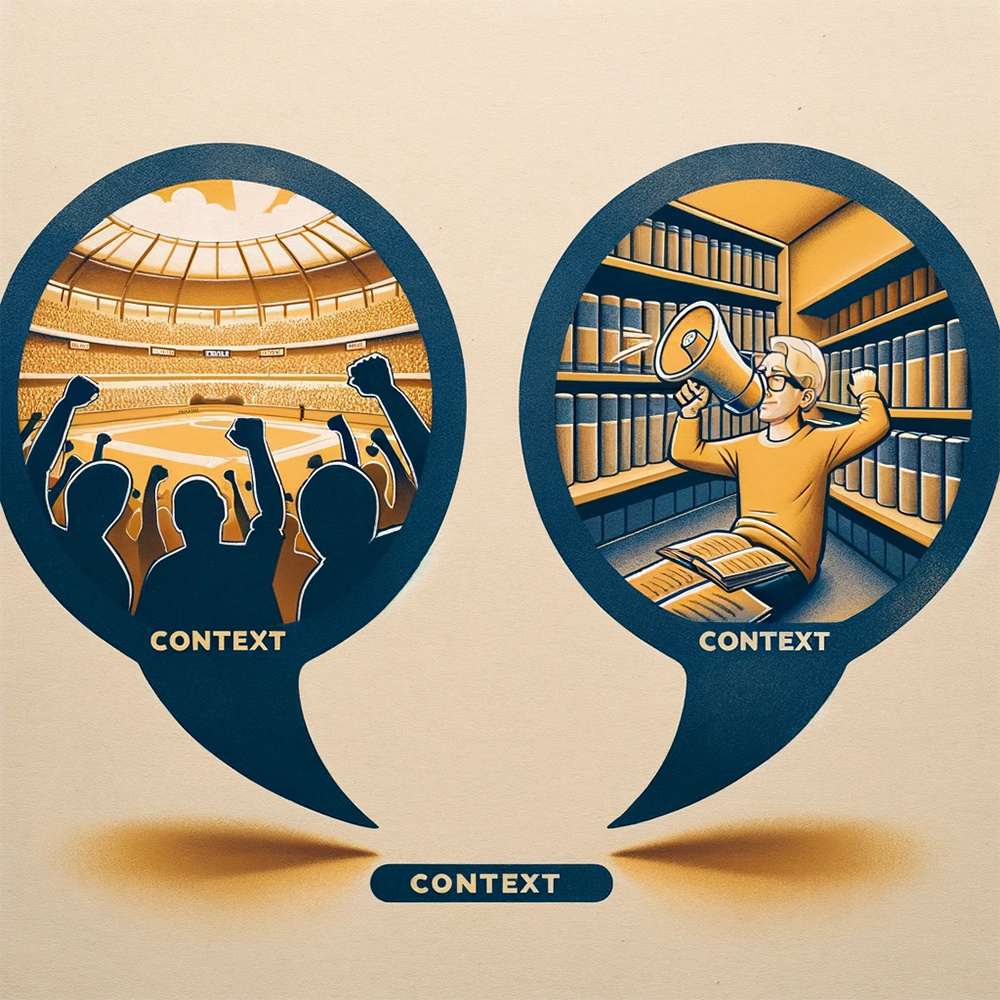Context
Definition
Context is a noun. It refers to the circumstances, background, or setting that surrounds a particular event, idea, or word, providing meaning and clarity to it.
Parts of Speech
- Noun
Pronunciation
American English
- IPA Pronunciation: /ˈkɑːnˌtɛkst/
- Respelling: KON-tekst
British English
- IPA Pronunciation: /ˈkɒnˌtɛkst/
- Respelling: KON-tekst
Etymology
The word "context" originates from the Latin "contextus," meaning "a joining together" or "composition." It is derived from "con-" (together) and "texere" (to weave). The term entered Middle English in the 15th century, primarily referring to the surrounding text or information that clarifies meaning.
Derivatives
- Contextual (adjective)
- Contextually (adverb)
- Contextualize (verb)
- Contextualization (noun)
- Out of context (phrase)
Synonyms
- Background
- Setting
- Framework
Antonyms
- Isolation
- Disconnection
- Separation
Usage
The term "context" is widely used to describe the circumstances or background that clarifies the meaning or understanding of an event, word, or idea. For example, "The quote was taken out of context," or "Understanding the historical context is essential for interpreting the text."
Related Terms
- Environment: The surroundings or conditions in which something exists or operates.
- Circumstances: The facts or conditions surrounding an event or situation.
- Perspective: A particular way of viewing or interpreting something, often influenced by context.
Detailed Definitions
Noun
- The circumstances or background relevant to an event, statement, or idea: Refers to the surrounding information that helps clarify meaning.
- Example: "The historical context of the speech helped understand its impact."
- The parts of a written or spoken statement that precede or follow a specific word or passage: Refers to surrounding text or statements that give clarity to a particular expression.
- Example: "The meaning of the word can change depending on the context."
context



🇨🇳 Mandarin
- 背景
- IPA Pronunciation: /pʰeɪ̯˨˩˦ t͡ɕiŋ˩˥/
- Respelling in English: bèijǐng
- 语境
- IPA Pronunciation: /yː˧˥ t͡ɕʰiŋ˧˥/
- Respelling in English: yǔjìng
🇮🇳 Hindi
- प्रसंग
- IPA Pronunciation: /prəsəŋɡ/
- Respelling in English: prasang
- संदर्भ
- IPA Pronunciation: /səndərbʱ/
- Respelling in English: sandarbh
🇪🇸 Spanish
- Contexto
- IPA Pronunciation: /konˈteksto/
- Respelling in English: contexto
🇫🇷 French
- Contexte
- IPA Pronunciation: /kɔ̃.tɛkst/
- Respelling in English: contexte
🇸🇦 Modern Standard Arabic
- سياق
- IPA Pronunciation: /siːʔaːq/
- Respelling in English: siyāq
- الخلفية
- IPA Pronunciation: /alxalfiːja/
- Respelling in English: al-khalfiyya
🇧🇩 Bengali
- প্রেক্ষাপট
- IPA Pronunciation: /prekʃapot/
- Respelling in English: prekshāpaṭ
- সন্দর্ভ
- IPA Pronunciation: /ʃondorbho/
- Respelling in English: shondorbho
🇷🇺 Russian
- Контекст
- IPA Pronunciation: /kɐnˈtʲɛkst/
- Respelling in English: kontekst
🇵🇹 Portuguese
- Contexto
- IPA Pronunciation: /kõˈtɛkʃtu/
- Respelling in English: contexto
🇮🇩 Indonesian
- Konteks
- IPA Pronunciation: /kontɛks/
- Respelling in English: konteks
🇩🇪 German
- Kontext
- IPA Pronunciation: /ˈkɔntɛkst/
- Respelling in English: kontext
🇯🇵 Japanese
- 文脈
- IPA Pronunciation: /bunmaɪ̯ku/
- Respelling in English: bunmyaku
🇻🇳 Vietnamese
- Ngữ cảnh
- IPA Pronunciation: /ŋu˧˧ kaːŋ˧˧/
- Respelling in English: ngữ cảnh
- Bối cảnh
- IPA Pronunciation: /boi˧˧ kaːŋ˧˧/
- Respelling in English: bối cảnh
🇰🇷 Korean
- 맥락
- IPA Pronunciation: /mɛk̚.ɾak̚/
- Respelling in English: maekrak
🇹🇷 Turkish
- Bağlam
- IPA Pronunciation: /baːɫam/
- Respelling in English: bağlam
🇵🇰 Urdu
- سیاق و سباق
- IPA Pronunciation: /sɪjaːq oː səbaːq/
- Respelling in English: siyāq o sabāq





